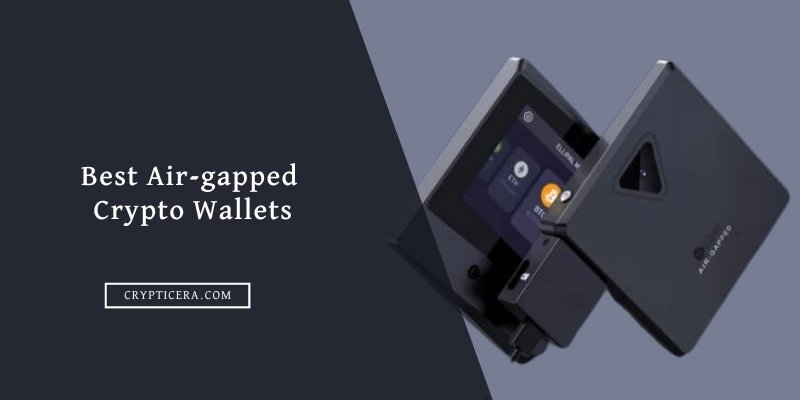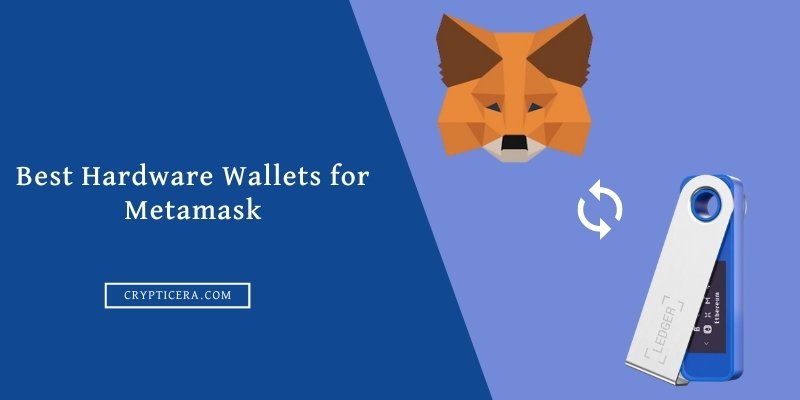Cryptocurrencies have gained a lot of popularity in recent years, and with this comes the need for safe storage. Crypto wallets offer users a way to store, manage, and exchange their digital assets. Open-source wallets are particularly beneficial because users can review the code, ensuring no hidden vulnerabilities or backdoors exist.
In this post, Let’s explore some of the best open-source crypto wallets available today. Also, discuss the unique features, advantages, and disadvantages of each wallet, as well as their supported digital assets.
How to choose the Best Open-Source Software Wallets
- 🔍 Research: Conduct thorough research on different open-source wallets available in the market.
- 🔑 Security: Look for wallets that prioritize security features such as encryption, two-factor authentication, and secure storage of private keys.
- 💸 Functionality: Choose a wallet that has the necessary features for your use case such as sending and receiving payments, multiple coin support, and ease of use.
- 👥 Community: Consider the size and activity level of the community supporting the wallet as it can impact the development and support of the wallet.
- 👨💼 Team: Look into the development team behind the wallet and their experience in the cryptocurrency space.
- 👍 Reviews: Check for reviews and feedback from other users to get a better idea of the wallet’s performance and reliability.
💡 Read the full guide: Best Open-source hardware wallets
List of 6 Best Open Source Cryptocurrency Wallets
| Image | Product | Rating | Price |
|
Open-source cold wallet (EAL6+ chip)
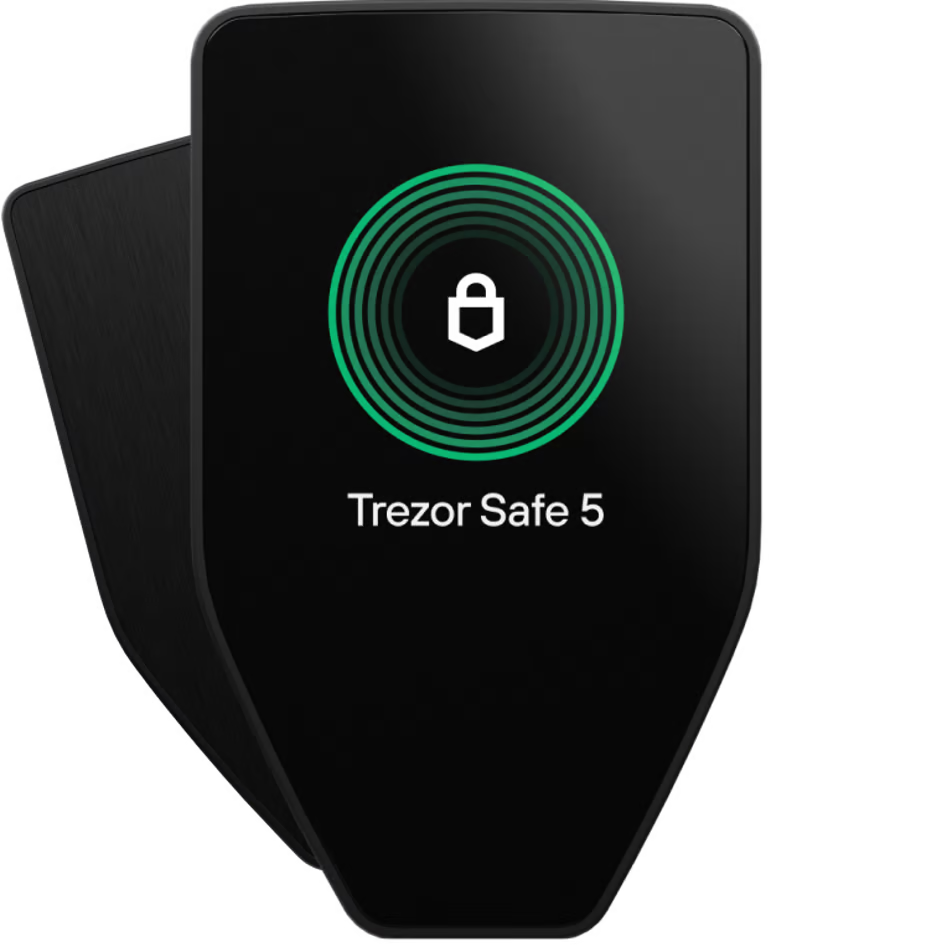 |
Trezor Safe 5 |
10
|
$169.00
|
Here is the list of safest open-source crypto wallets with visible source code on GitHub for security audits and bug fixes:
- MyEtherWallet (MEW): Best Open-source Ethereum Wallet
- Electrum: Best Open-source Bitcoin Wallet
- Alpha Wallet: Best Open-source Web3 Wallet
- Bitpay Wallet: Best Wallet for fiat-on ramp
- Mycelium: Safest Open-source BTC crypto wallet
- Blockstream Green: Top Bitcoin Liquid Wallet
1. MyEtherWallet (MEW): Best Open-Source Ethereum wallet

MyEtherWallet (MEW) is a free open-source crypto wallet and client-side interface for generating and managing Ethereum wallets. One of its unique selling points is its integration with hardware wallets like Trezor and Ledger. This means users can store their private keys offline in cold wallets, significantly reducing the risk of theft or hacking.
You can choose from different types of wallets, such as software, hardware, paper, and web3 wallets. You can also use the MEW app or the Enkrypt browser extension to access your wallets. You can send and receive ETH and ERC20 tokens, as well as exchange them with other cryptos or fiat currencies through its built-in services like Bity, Kyber Network, Changelly, and Simplex.
MEW is a community-driven platform that is constantly updated and improved by its developers and users. It also works well with other popular Ethereum tools and platforms, such as MetaMask, Etherscan, Infura, and Geth.
Key features
- Generates and manages Ethereum wallets.
- User-friendly interface for wallet management.
- Supports a wide range of ERC20 and ERC721 tokens.
- Provides offline functionality for added security.
- Integrates with popular hardware wallets.
- Offers a built-in token swap feature.
Pros and cons
| Pros | Cons |
|---|---|
| Easy-to-use interface | Potential security risks |
| Open source (check code for vulnerabilities) | No official customer support |
| Decentralized and Non-Custodial | No fiat integration |
| Free to use |
2. Electrum: Best Open-Source BTC Wallet
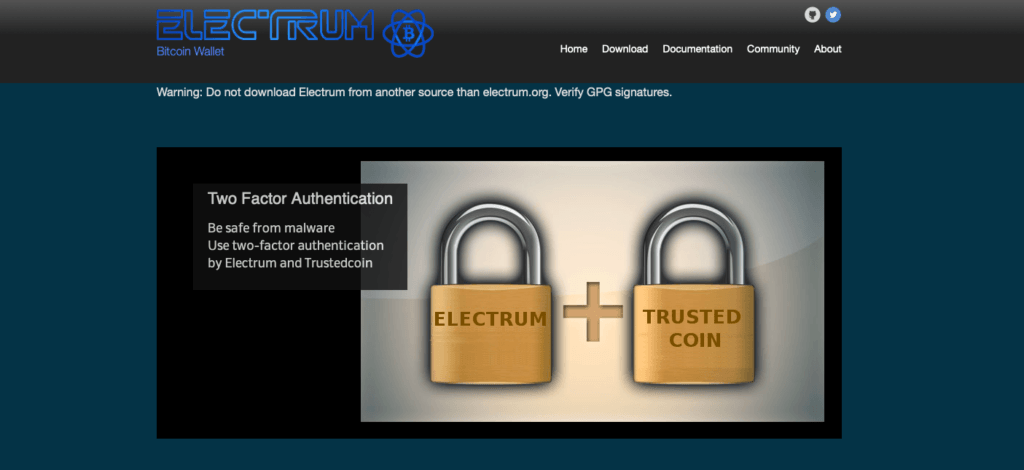
Electrum is considered one of the most secure Open-Source Bitcoin wallets available. It uses a hierarchical deterministic (HD) wallet structure, which means that it generates a new address for every transaction, making it difficult for hackers to trace the transaction history. The wallet also supports two-factor authentication (2FA) and multi-signature (multi-sig) transactions, which add an extra layer of security.
Electrum is available for desktop (Windows, Mac, and Linux), mobile (Android), and hardware wallets (such as Ledger and Trezor). This makes it easy for users to access their Bitcoin wallets from different devices.
It is free software that is released under the MIT License. Anyone can run an Electrum server and no single entity controls the network. Electrum Wallet also verifies all the transactions in your history using SPV.
Key Features
- Your private keys are encrypted and kept on your computer.
- Funds can be recovered with a secret phrase.
- Electrum is fast due to indexing the blockchain.
- Electrum servers are decentralized and redundant.
- Verifies transactions using SPV.
- Private keys can be kept offline with a watch-only wallet.
- Allows splitting of permission to spend coins between wallets.
- Supports third-party plugins like multisig services and hardware wallets.
Pros and Cons
| Pros | Cons |
|---|---|
| Popular and trusted | Intimidating interface for new users |
| High-security features | only store Bitcoin (BTC) |
| Open source software wallet | |
| Lightweight and fast | |
| Advanced features for transaction Privacy |
3. Alpha Wallet: Best Open-source Web3 Wallet
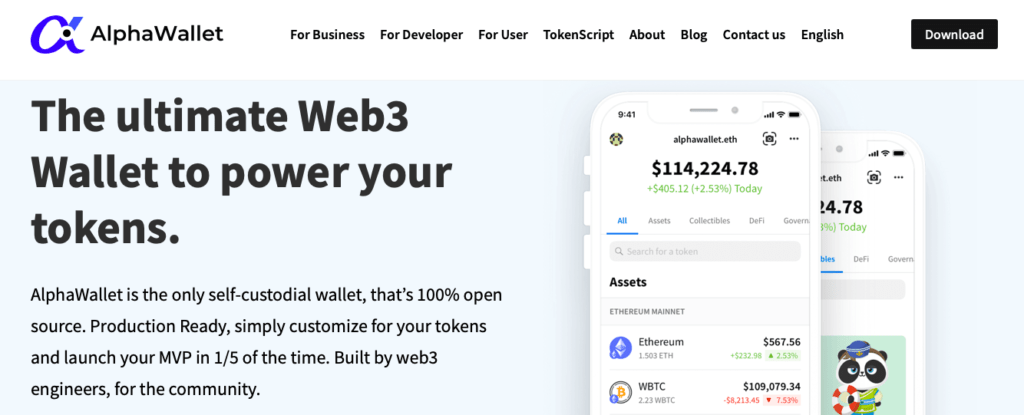
Alpha Wallet is an open-source Web3 wallet that allows users to store and manage their cryptocurrencies, decentralized applications, and digital assets on the blockchain. It is the best 100% open source self-custodial wallet.
It supports ETH and ERC20 tokens, as well as other blockchains through its multichain browser extension, Enkrypt. It also integrates with trusted third-party services and its own decentralized exchange, Mycelium Local Trader.
Alpha Wallet has full security compliance with Secure Enclave technology and phishing-proof signed SmartTokens. The Defi wallet has other features as well such as the ability to earn with DeFi, keep your collectibles, manage your name, send with MagicLink, buy crypto with fiat, prove your identity, and access services with tokens.
Key Features
- AlphaWallet is a mobile Ethereum wallet for securely storing and managing digital assets.
- It supports various cryptocurrencies and tokens, including ETH, ERC-20, ERC-721, ERC-1155, and more.
- AlphaWallet enables users to access decentralized applications (DApps) directly from the app.
- It optimizes gas prices to reduce transaction fees and improve transaction speed.
- Users can customize their wallets with different themes and backgrounds.
- AlphaWallet provides easy backup and recovery options.
- It is an open-source project developed by a community of contributors and developers.
Pros and cons
| Pros | Cons |
|---|---|
| User-friendly interface | A limited number of supported cryptocurrencies |
| Supports staking for some cryptocurrencies | Only available on iOS and Android |
| Allows for easy and fast token swapping | No fiat off-ramp |
| Supports hardware wallets | |
| Provides access to decentralized finance (DeFi) applications |
4. BitPay Wallet
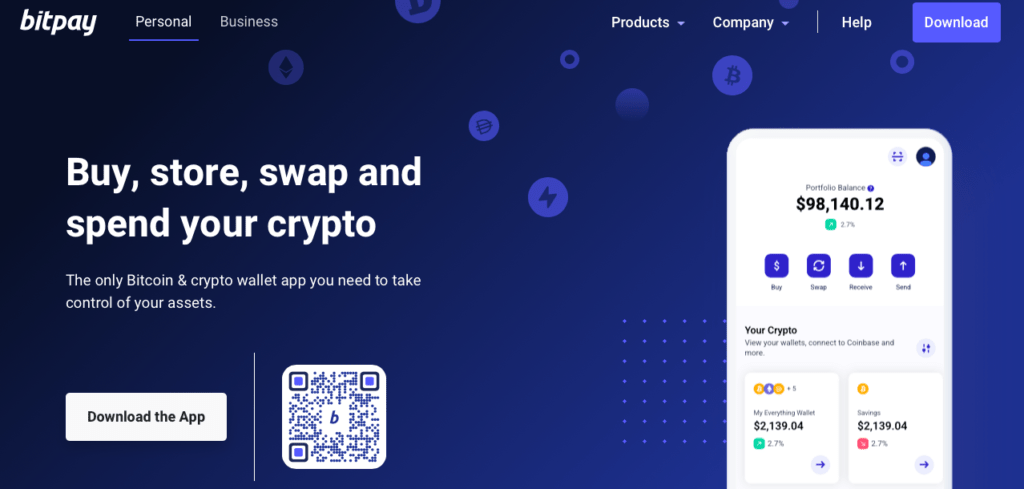
Bitpay (Copay) is an open-source mobile wallet that allows users to manage their cryptocurrency assets. You can find the source code on Github here. It supports various cryptocurrencies, including Bitcoin, Bitcoin Cash, Ethereum, and stablecoins like USDC and GUSD. Users can buy, sell, and store cryptocurrencies using the Bitpay wallet.
The wallet also allows users to spend their cryptocurrency at merchants who accept payments through Bitpay. Security features include multi-factor authentication and the ability to lock the app with a PIN code. The wallet is available for both iOS and Android devices and is free to download and use.
Key features
- Supports multiple cryptocurrencies
- Offers payment integration
- User-friendly interface
- Provides a high level of security
- Links to BitPay Visa Card for spending
- Real-time transaction tracking
Pros and Cons
| Pros | Cons |
|---|---|
| Easy-to-use interface | A non-profit organization (fewer updates and security) |
| Multi-platform support (iOS, Android, Web) | No desktop app is available |
| Secure storage of private keys | Limited customization options for transaction fees |
| Non-custodial wallet (users control their funds) | |
| Ability to buy and sell cryptocurrencies within the app | |
| Supports hardware wallet integration for added security |
5. Mycelium: Free Open-source Bitcoin Wallet
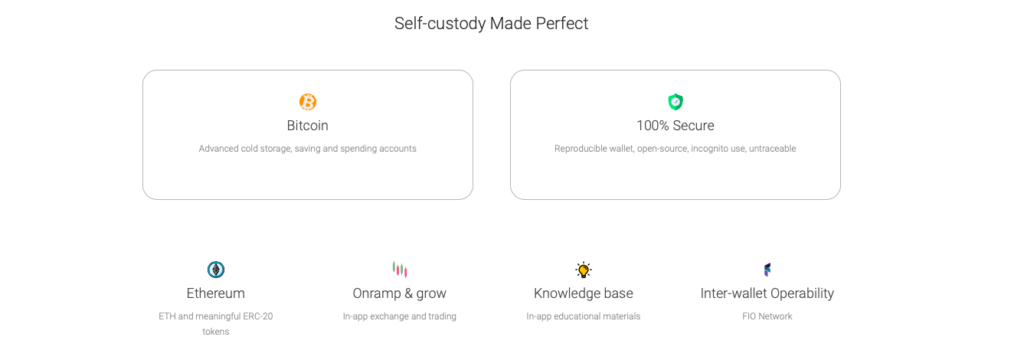
Mycelium uses a Hierarchical Deterministic (HD) wallet, which generates a new Bitcoin address for every transaction to enhance privacy and security. The wallet allows users to create a backup of their private keys and restore their wallets in case of loss or theft. It can also be used in conjunction with compatible hardware wallets for added security.
Key Features
- The app supports hardware wallets such as Trezor, Ledger, and KeepKey.
- Cold storage options include paper wallets and watch-only accounts.
- Single-address accounts have a separate backup system.
- The app features multiple levels of PIN protection.
- The app protects against pattern sniffing by using variable keyboard layouts.
- The TOR network is supported to conceal the user’s IP address and location.
- Users have the option to manually disable all third-party services.
- Users can download the application directly as an APK file.
Pros and Cons
| Pros | Cons |
|---|---|
| Open source reproducible wallet | Not User Friendly |
| High level of security | No two-factor authentication |
| Multiple backup options | Limited cryptocurrency support |
| Integration with hardware for cold storage |
6. Blockstream Green: Bitcoin Liquid Wallet

Blockstream Green is an open-source, multiplatform Bitcoin wallet created by Blockstream. It has a user-friendly interface and supports features such as two-factor authentication, multi-signature support, and integration with hardware wallets.
Additionally, it allows users to buy and sell Bitcoin directly from the app and puts users in control of their private keys. Blockstream Green is secure and is available for download on both iOS and Android devices, making it a reliable and convenient Bitcoin wallet for users.
Key Features
- Singlesig Support
- Multisig Shield
- Hardware Wallet Support
- Transaction costs can be kept low with SegWit and customizable fees
- Multilingual
- No documents, personal information, contact details, or KYC required
Pros and Cons
| Pros | Cons |
|---|---|
| Easy-to-use interface | Only Bitcoin supported |
| Multi-device support | customer support issues |
| Open source wallet | |
| 2-factor authentication | |
| customizable fees |
What is an Open-Source Crypto Wallet?
An open-source crypto wallet is a software application that allows users to securely store, send, and receive cryptocurrencies, such as Bitcoin and Ethereum. It is open source, which means that the software code is publicly available and can be reviewed and modified by anyone.
This makes the wallet transparent and secure, as any potential vulnerabilities can be identified and fixed by the community. Open-source wallets typically support fewer cryptocurrencies and provide users with private keys, which are used to access their funds.
You can also view transaction history, check their balance, and create new addresses (HD) to receive funds. Open-source cryptocurrency wallets are often free to use and can be downloaded from the internet or obtained from app stores.
How Does Open-Source Wallet Work?
Open-source crypto wallets work by utilizing blockchain technology to securely store and manage cryptocurrency. When a user creates an account with an open-source wallet, they are given a unique address and private key. The private key is used to sign transactions and prove ownership of the cryptocurrency held in the wallet.
When a user sends cryptocurrency, the transaction is broadcast to the network of nodes that support the particular cryptocurrency. The nodes verify the transaction and add it to the blockchain, which is a decentralized ledger that records all transactions in the network. The wallet is updated with the new transaction information and the user’s balance is adjusted accordingly.
Final Thoughts: Is Open-source Wallet Worth it?
In conclusion, choosing the best open-source wallet for your cryptocurrency needs requires careful consideration of several factors. Security, functionality, community support, development team experience, and user reviews are all important factors to consider.
By conducting thorough research and considering all these factors, you can select the top open-source wallet that meets your specific needs and provides the security and functionality you require for your cryptocurrency transactions.
Related FAQs
Is Coinbase wallet open-source?
No, Coinbase wallet is not fully open-source. While certain components of the wallet are open-source, the complete source code is not publicly available.
Are Open-source Wallets Safe?
Yes, Open-source digital wallets are generally safe, but it ultimately depends on the quality of the code and the security practices implemented. Free Open-source wallets can be audited by the community, and any vulnerabilities can be identified and fixed quickly. However, it is important to choose a reputable wallet with a proven track record of security.
Are Open-source crypto Wallets more secure than closed-source?
Not necessarily. While open-source wallets have the potential to be more secure due to community auditing and rapid vulnerability fixes, it ultimately depends on the implementation and security practices of the wallet. Closed-source wallets can also be secure if they have undergone thorough security audits and have a proven track record of security.
Are Metamask, Trust Wallet, and binance Open-Source?
No, Trust Wallet, MetaMask, and Binance are not open-source wallets.
Which blockchain is open source?
When the platform code is free and open for anyone to access and modify, the blockchain is open source. This fosters openness, cooperation, and innovation in the blockchain community. Ethereum, Hyperledger, and Binance Smart Chain are some open-source blockchains.
Why do we need an open source digital wallet?
An open source digital wallet is needed because it has many advantages over closed-source or proprietary wallets. With an open-source digital wallet, users would have more power over their personal data and could trust that their privacy is safeguarded. u003cbru003eu003cbru003eA digital wallet could also enable new business models that benefit users instead of charging fees and selling data. It would also solve the issues of vendor lock-in, interoperability, security, and trustlessness that exist in current wallets.
What are the best Open-source hardware wallets?
Some of the top open-source hardware wallets are the Keystone Pro AirGap wallet, Trezor Wallet, BitBox Bitcoin wallet, and NGRAVE ZERO cold wallet.


